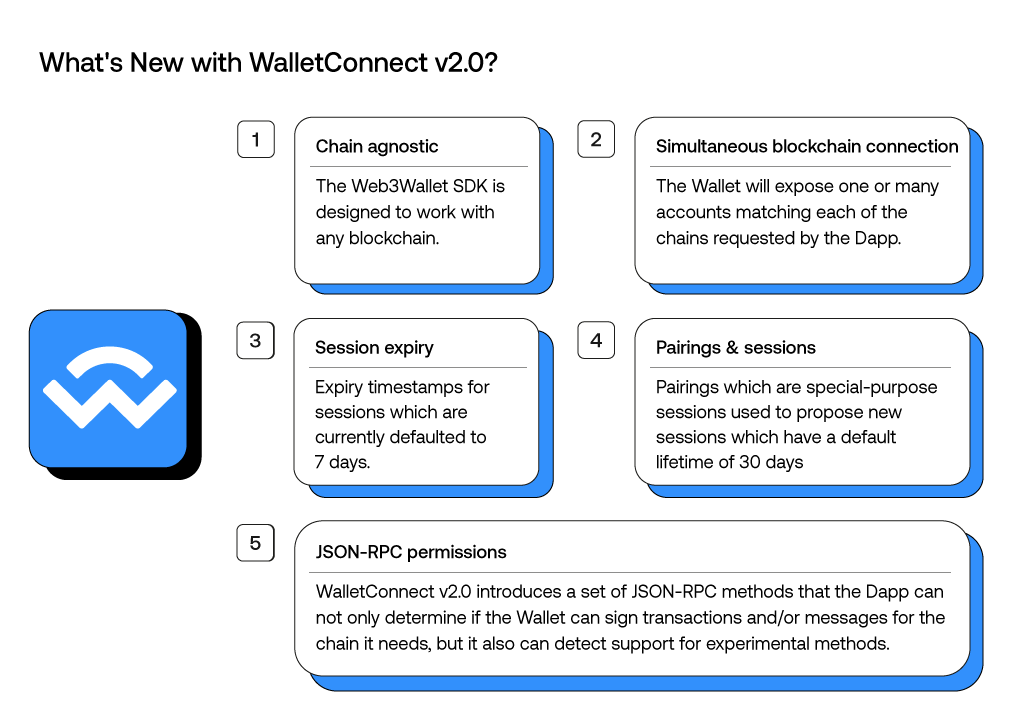
WalletConnect, an open-source protocol has seen a version two rollout. Version one has been a breakthrough for blockchain wallets as WalletConnect is an essential component between crypto wallets and decentralized applications, or dApps. Now WalletConnect has released a second version of the communications protocol. What has changed and what has improved?
Table of Contents
- The New and Improved WalletConnect 2.0
What is WalletConnect?

WalletConnect is an open-source protocol and infrastructure that allows the connection between crypto wallets and dApps. Users make the connection by simply scanning a QR code enhancing a seamless and secure connection between the two. Of course, your SecuX wallet will work with WalletConnect 2.0 as we are an official partner of the latest version.
The Benefits of WalletConnect Protocol
- Quick and seamless connection
- Carry out actions directly from crypto wallets such as authorizing actions and interacting with dApps
- Secure peer-to-peer encrypted connection
- Improves user-friendliness
- Maintains user privacy by interacting with dApps without having to share your private information
- The protocol is widely adopted and supported by many dApps and wallets
WalletConnect Drawbacks
- It requires a very stable and reliable internet connection
- Supports a wide range of wallets, but not every one
- Difficult implementation for developers not well-versed in blockchain technology and decentralized protocols
What’s New with WalletConnect v2.0?

We can see some loopholes in what is fundamentally a great leap forward in dApp and crypto wallet communication. Now that WalletConnect has released a new and improved version, what’s changed?
The new WalletConnect protocol is chain agnostic. This means that WalletConnect will provide interoperability between multiple blockchain networks.
Speaking of multiple blockchains, WalletConnect v2.0 makes it possible to connect to a decentralized app on many blockchains at the same time. This simultaneous connection boosts efficiency.
When a connection is made between a wallet and a dApp, a pairing is produced. This means users would not have to pair them up again the next time they wish to connect the same wallet to the same dApp.
WalletConnect v2.0 now implemented session expiry timestamps, which last for 7 days. In the first version, there was no session timeout, which means the connection would continue until one or both clients disconnected.
When using chain agnostic interfaces, compatibility issues can happen between apps and wallets. The methods they use to communicate may conflict. The JSON-RPC permissions are an attempt to fix this issue.
Before the connection is established between the wallet and the dApp, JSON-RPC will first “describe” the API methods required for the app, and the wallet will use this information to determine whether it can support or approve them. Basically, the JSON-RPC permissions facilitate app-wallet communication.
Conclusion
Version one was great, it was a breakthrough in wallet-app communication, but not without some drawbacks. Addressing this, WalletConnect brings version 2.0, a solution to many of the problems that the original version had. It allows users to securely connect wallets to dApps on different chains simultaneously among plenty of other benefits.
Related Articles:
- NFT Airdrops – An Easy Distribution Method
- FIO Crypto Handles – A Complete Guide
- Chat GPT Smart Contract Audit – Can It Do It?

0 comments